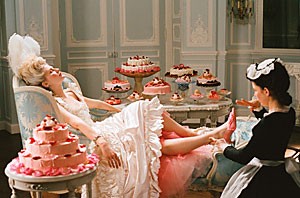When most teenagers act recklessly – blowing their savings, throwing wild parties, neglecting their responsibilities – they get grounded. Marie Antoinette got sent to the guillotine.
Sofia Coppola’s “”Marie Antoinette”” is probably the most polarizing film of the year. It was greeted at Cannes with a chorus of boos and greeted here with mixed and largely condescending reviews.
The point on which all the condescension seems to turn is the notion that Coppola, in crafting a sympathetic portrait of Marie as an innocent who was swept up by the whirlwind of history, is projecting a kind of idealized self-portrait. The same was said of her use of Scarlett Johansson’s character in “”Lost in Translation.””
All this really says is that film critics feel free to armchair-analyze and condescend to female directors in a way they would never dream of doing with, say, Martin Scorsese or Spike Lee.
It’s easy to understand why the film has been received with such confusion. With its post-punk soundtrack and defiantly contemporary feel, it’s a slap in the face to all those stuffy, cautious period dramas. Yet it also has a grave, even tragic undercurrent.
“”Marie Antoinette”” is pitched almost perfectly between tragedy and fluff. It’s not at all an easy film to define. You may find yourself thinking back to its days after you see it, asking yourself what it “”meant.””
Despite her sad fate, Marie Antoinette has been ill-treated by posterity; she’s still best known for allegedly sneering of her starving subjects, “”Let them eat cake.””
Of course, it was only a rumor. As Marie complains in the film: “”Anyone who knows me knows I’d never say that!”” But myths die hard.
The film plays with the line’s notoriety. It opens with a long shot of Marie lounging in a chair, receiving a pedicure and gazing into space. She lazily reaches out a hand and dips a finger into – you guessed it – a cake.
The film begins conventionally enough, with 14-year-old Austrian princess Marie arriving in France to be engaged to the unprepossessing Louis XVI (Jason Schwartzman). Unfortunately, her new husband is a shy creampuff who prefers small talk about his favorite hobby (collecting vintage locks) to anything amorous, and the court is crammed with sharp-tongued gossips straight out of “”Heathers.””
At first, the film has the makings of a Pollyanna story, with bright-eyed Marie brightening up a grim and humorless court with her playfulness.
In an early scene, Marie stands up at the end of a court play and claps; someone whispers to her that this simply isn’t done, and she defiantly continues clapping until the rest of the crowd eagerly joins in. It’s straight out of a Disney movie.
But the story soon takes a different turn. Bored with the monotony of palace life, Marie takes to partying all night. Her adviser warns her that she’s spending too much money, but she’s having too much fun to care.
The film’s party scenes are a delight, set to a stunning soundtrack of post-punk and new wave – New Order, Bow Wow Wow, Adam and the Ants, and Siouxsie and the Banshees – that vividly project the giddy, hedonistic atmosphere more than any period music ever could. Coppola wants us to feel the excitement of the time, not admire it from afar.
Even as the film’s sense of fun kicks into gear, one becomes aware of the growing chill around the edge of every scene.
When Marie and her friends wander around a farm and laugh at the chickens running loose (as the farmers rush to catch them), it’s hard not to think of Paris Hilton and Nicole Richie in “”The Simple Life.”” The scene is funny, but it shows how hopelessly alienated the royals are from their subjects – every bit as much as modern celebrities are from ordinary people.
“”Marie Antoinette””
PG-13
123 minutes
Sony Pictures
Score: 9/10
Near the end of the film, Marie stands up again to clap at a play, and the rest of the crowd silently turns to face her, glowering. A few scenes later, an angry mob is pounding on the palace doors, screaming for her head.
The family prepares to flee, but Marie suddenly walks out on a balcony to face her subjects. As the crowd roars, Marie bows her head, as if preparing to have her head cut off. The crowd is stilled, and shouts of “”Vive la Queen!”” are heard.
It’s a remarkable moment. Marie has finally grown up – but her transformation has come too late, and the crowd’s change of heart is temporary. Therein lies her tragedy.
“”Marie Antoinette”” is not for everyone. Those who expect either a serious period drama or a good-natured bit of fluff may be disappointed. But it’s as close as you’ll ever get to stepping right into an impossibly glamorous moment in history, one that was on the verge of passing away forever.









